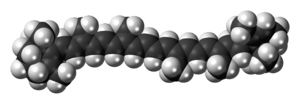alpha-Carotene
 | |
 | |
| Identifiers | |
|---|---|
| 7488-99-5 | |
| 3D model (Jmol) | Interactive image |
| ChEBI | CHEBI:28425 |
| ChemSpider | 3571861 |
| PubChem | 6419725 |
| UNII | 45XWE1Z69V |
| |
| |
| Properties | |
| C40H56 | |
| Molar mass | 536.873 |
| Except where otherwise noted, data are given for materials in their standard state (at 25 °C [77 °F], 100 kPa). | |
| | |
| Infobox references | |
α-Carotene is a form of carotene with a β-ionone ring at one end and an α-ionone ring at the opposite end. It is the second most common form of carotene.
Human physiology
In United States adults and Chinese adults the mean concentration of serum α-carotene was 4.71 µg/dL, including 4.22 µg/dL among men and 5.31 µg/dL among women (to convert to micromoles per liter, multiply by 0.01863).[1]
Health effects
Dietary intake affects blood levels of α-carotene, which in one study was associated with significantly lower risk of premature death.[1][2]
Dietary sources
The following vegetables are rich in alpha-carotene:[1]
- Yellow-orange vegetables : Carrots (the main source for U.S. adults), Sweet potatoes, Pumpkin, Winter squash
- Dark-green vegetables : Broccoli, Green beans, Green peas, Spinach, Turnip greens, Collards, Leaf lettuce, Avocado, Parsley (10.7 microgram/gram dried parsley leaf)[3]
References
- 1 2 3 Li C, Ford ES, Zhao G, Balluz LS, Giles WH, Liu S (March 2011). "Serum α-carotene concentrations and risk of death among US Adults: the Third National Health and Nutrition Examination Survey Follow-up Study". Arch. Intern. Med. 171 (6): 507–15. doi:10.1001/archinternmed.2010.440. PMID 21098341. [Those With High Alpha-Carotene Blood Levels Live Much Longer Lay summary] Check
|laysummary=value (help) – Medical News Today (22 November 2010). - ↑ Alpha-carotene Linked to Lower Mortality Rates , Tufts Health and Nutrition Letter, March 2011
- ↑ Nutritional Data, Parsley, accessed 2013.08.05
This article is issued from Wikipedia - version of the 9/8/2016. The text is available under the Creative Commons Attribution/Share Alike but additional terms may apply for the media files.